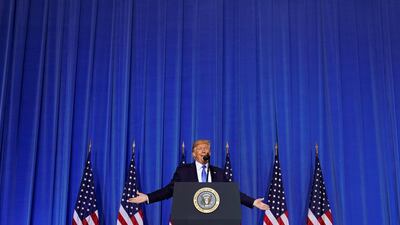As US secretary of state Mike Pompeo visited India, and the G20 summit got under way in Japan on Friday, with President Donald Trump in attendance, there was increasing talk of Washington’s foreign policy incoherence.
Multiple geopolitical crises remain at varying levels of volatility, notably Iran, Venezuela and North Korea. US-China trade tensions continue to simmer and the Trump administration is at odds with both Turkey and India over their decision to purchase Russian S-400 surface-to-air missile systems. Ankara and Delhi's defiance could trigger US sanctions. Mr Trump has already annoyed India by withdrawing the decades-old privilege of duty exemptions, worth more than $6 billion in 2018, on many Indian goods.
The common thread running through all of the above is President Trump's concept of "maximum pressure" to achieve goals he sees to be in the American interest. This strategy has meant a US administration that routinely takes a tough approach towards allies and adversaries alike, sometimes threatening military action – first against North Korea, then Nicolas Maduro's regime in Venezuela and, more recently, Iran. Mostly however, the Trump administration is waging economic warfare, with sanctions, tariff barriers and trade disruption.
All of this has led to increasing confusion around the world about American intentions and desired foreign policy outcomes. Among intensifying doubts about Mr Trump’s judgement and foreign policy instincts, the only predictable certainty is unpredictability.
The signs now point to a world order that is adjusting to accommodate an altered reality, in which the US either fails to take the lead or to play any role at all. For the G20 summit for instance, Japan's Prime Minister Shinzo Abe had identified three key issues for discussion – all of which he must have known would displease Mr Trump. The first was to do with strengthening free and fair world trade. This would be through a 16-country advanced free-trade agreement called the Regional Comprehensive Economic Partnership, of which the US is not a part. Mr Abe also wanted the G20 to work towards reforming the World Trade Organisation to make it "relevant again as a guardian of free and fair international trade". Second he wanted a global set of rules to spread the benefits of the digital economy. Third, a worldwide push for innovation to tackle the effects of climate change.
The European Union is, meanwhile, considering a way to get around Mr Trump’s attempt to prevent the WTO from resolving trade disputes. With Mr Trump blocking appointments to the world’s top trade court, it is likely to be left with just one judge and will be unable to operate by December. Accordingly, Europe is proposing a simple but smart “interim solution”. It calls for the EU and any other WTO member with which it is in a trade dispute to jointly agree to a new judicial procedure, to be overseen by former WTO appeals judges.
Of a piece with these determined attempts to sidestep the US is the recent display of China-North Korea ideological kinship. President Xi Jinping made his first state visit to Pyongyang, and his host Kim Jong-un put on a good show – but, ultimately, it was meant to stress China’s important role in any deal to be made with North Korea.
In a summing up of the mood in many capitals towards Washington’s behaviour, Mireille Clapot, vice president of the French parliament’s foreign affairs committee, recently said: “What President Trump says or does is certainly what he thinks is good for the United States. I cannot certify it’s good for the entire world.”
What is increasingly clear is that the world has few illusions or expectations of the US’s reliability and fitness as a role model, so long as it is led by Mr Trump. This undoubtedly contributes, at least temporarily, to a loss of meaningful influence for America and is a sobering reminder of the reason the character and impulses of political leaders have always been considered key to the trajectory of countries and the arc of human happiness.
Back in 10th-century Baghdad, the Arab world’s most original thinker Al Farabi dreamt about an ideal state, a utopia somewhat like the one envisioned by Plato in ancient Athens. Al Farabi called it the “virtuous city”, one best suited to promote human happiness because it would be led by a virtuous, ideal ruler with a fierce love of justice and a solid knowledge of practical affairs. The ruler’s character, Al Farabi said, was key to the virtuous city’s ability to eschew “faulty judgement” and not “miss the right path”. He must not give the “wrong impression through falsifications, cheatings and deceptions”.
The mention of a leader's deceptions by Al Farabi might sound startlingly like something a TV analyst might say today in the context of the 10,796 false or misleading claims by Mr Trump, as of June 7, his 869th day in office, according to The Washington Post's Fact Checker. But Al Farabi, who lived in the rich and powerful multi-ethnic commonwealth that was the Abbasid empire, was watching something not too dissimilar from what we are seeing today. In Al Farabi's time, the Abbasid empire was in decline, just as America is visibly and wilfully becoming less of a force for good today.


